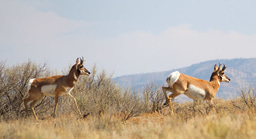Using ChatGPT for Conservation - Opportunities, Risks and Fears

As a professional coach empowering conservation practitioners, I am intrigued and wary of the current eruption of AI technology, most immediately being ChatGPT (Generative Pre-trained Transformer). This innovative technology powered by artificial intelligence enables dynamic conversations and opens a world of possibilities for everyone including conservationists. It works by the user asking it a question or requesting content and the program creating relevant text - perhaps this very article! Want to take a guess whether it's human or AI generated?
I am curious to hear what others are up to in their use and experience of ChatGPT. Even more, I’d love for those that want to give it a go perhaps that little stimulus needed to get started. This is a professional skill for now that is freely accessible.
Fears, risks and challenges of using ChatGPT
I wonder if you have tried using ChatGPT yet? I delayed my use because I was quite happy with how I used to generate content; I was fearful it was perhaps wrong (maybe inauthentic) to use artificial intelligence rather than my own and I was also fearful perhaps I was exposing or revealing more of myself to cyberworld than would be cyber-safe. I also had a touch of wanting to avoid the discomfort of sitting in front of a new technology and not knowing exactly what to do with it. What changed for me was firstly calling on some courage to feel the fear and have a go regardless, starting with some very baby (low risk) steps. My very first question of ChatGPT was ‘what are some innovative approaches a group can take to raise funds?’
Beyond personal fears, there are substantive risks and issues. As conservation practitioners and more fundamentally, responsible citizens of a global community, we must be aware of the limitations and potential pitfalls associated with utilizing AI technology. Biases, both inherent in the data that trains ChatGPT and introduced by user input, can impact the accuracy, fairness, and usefulness of the responses. Additionally, ChatGPT may lack domain-specific knowledge, requiring us to critically evaluate the information it provides. The challenges for physical, biological, and social scientists will be both similar and different. How have, or might we, navigate these challenges and ensure use of ChatGPT aligns with the principles and goals of conservation, science, social ethics? Discussions and consideration of how we can engage with these issues is likely to be far more productive than denial, avoidance or ranting about the risks of this exciting (maybe daunting) and increasingly prevalent tool.
Leveraging Opportunities for Conservation
Perhaps you have already harnessed ChatGPT to advance your conservation work? Can you share an example of an innovative solutions, enhanced decision-making, or accelerated research that have emerged using ChatGPT by yourself or a colleague?
Amidst the challenges, ChatGPT also offers immense opportunities for conservation practitioners. It serves as a powerful tool for exploring innovative solutions, enhancing decision-making processes, and accelerating research endeavours. By engaging in dynamic conversations with ChatGPT, we can tap into its vast knowledge base, gain fresh perspectives, and unlock novel approaches to address complex conservation problems. What’s a problem or opportunity you could put to ChatGPT.
Ethical Considerations and Responsible Use
How can we ensure the ethical and responsible use of ChatGPT in our conservation work? If you currently use ChatGPT, what steps do you take to mitigate potential risks and maximize the benefits it offers? If you don’t use it, what steps would you like users to be taking?
The use of AI technologies like ChatGPT requires us to be mindful of ethical considerations. It is essential to establish protocols and guidelines for responsible use, ensuring that our interactions with ChatGPT align with our conservation values. As practitioners, we must be vigilant in evaluating and verifying the information provided by ChatGPT to avoid any unintentional harm or misinformation.
Fostering Collaboration and Community Engagement
In what ways have you used ChatGPT to foster collaboration among conservation practitioners and engage with the wider community? How might it facilitate knowledge sharing and inspire collective action?
ChatGPT can serve as a platform for connecting conservation practitioners worldwide, fostering collaboration, and sharing knowledge. By engaging in conversations with ChatGPT, we can exchange ideas, discuss challenges, and crowdsource innovative solutions. This interactive approach encourages collaboration within this and other communities. It empowers individuals to actively contribute to and participate in conservation efforts. How might we leverage ChatGPT within WildHub to foster collaboration, engage with the conservation community beyond WildHub, and inspire collective action?
Conclusion
As professionals in many fields, including conservation, our journey with ChatGPT, like any journey, can be filled with both opportunities and challenges. ChatGPT holds immense potential to revolutionize approaches to conservation, but it also demands thoughtful consideration and responsible use. By addressing the challenges, leveraging the opportunities, and ensuring ethical practices, we can harness the power of ChatGPT to advance our conservation goals. Let’s share our experiences, insights, and concerns regarding ChatGPT generally and specifically for conservation. Together, let's navigate this ever-evolving landscape be leaders in using AI technology to enhance the only planet we have to live in and enjoy.
Footnote – it probably does not surprise you that I asked ChatGPT to generate a 500 word article about how conservation practitioners could use ChatGPT. I had a draft response within 60 seconds. I asked for one refinement and then spent the next hour or two editing to make it more ‘mine’ and learning more about ChatGPT. With hindsight, the original response would have been fit for the purpose of starting a conversation and saved me two hours!
Photo by Possessed Photography on Unsplash




Please sign in or register for FREE
If you are a registered user on WildHub, please sign in
Excellent
It's an interesting area to explore. I still haven't used ChatGPT for anything, so I don't have much other than assumptions to add to the topic. Like any tool, I think it could be useful, but I don't want my creativity or ethics to get muddled. Checking sources and making sure things aren't plagiarized would remain imperative to the creation process. I worry that ChatGPT might speed the process in which misinformation gets spread otherwise. However, it does sometimes look fun to play with.
thanks for your contribution Lara.
intellectual property and creativity are challenging issues. from my research (chatGPT Q&A) content from one chat is not used to inform a separate chat. still much to learn for me.
Ethics, plagiarism and referencing are good points to keep in mind too.
I used ChatGPT to see if it could generate a useful logo for my company ... waste of my time. I could have prodded for more or better but ran out of the monthly free credits and the results thus far did not incentivize me to spend a dime.
Besides the direct questions and issues that you raise, I am more interested in the dynamics of a world, or in this case the entire conservation sector, that starts using ChatGPT or other AI tools? Does that lead to more or less good or bad results, or will the developments all balance out to a new status quo - different but in many ways the same? For example, what happens if all funding applications are written with the help of ChatGPT?
There is a matter of access. Can everybody in a sector have the same access to such tools? Or do we get a reproduction of the same 'haves' and 'haves not'? Or perhaps it becomes a matter of who can pay what for the use of which AI? What does that do to the overall dynamics in nature conservation?
What happens if both parties of an interaction use an AI tool? For example, an applicant can use ChatGPT to write a funding proposal, but a sponsor can also use an AI to analyze those proposals. Perhaps ChatGPT can be used to recognize its own handywork. If so, will the proposal loose points in the evaluation, or is a good idea simply a good idea - no matter who or what came up with it? And are the sponsors going to use an AI to determine what is a good idea?
About your footnote ... another conclusion could be that considering that you wanted to write a text that is 'yours' and you did invest two hours, could you not also have spent the two hours to write it from scratch? The situation sounds similar as with OCR and voice recognition : the tech works fast but is not flawless, and correcting the mistakes, i.e. make it perfect, can take as much time as not using the tech.
We will see a lot of actions, changes, discussion, panics, fears, expectations, warnings, etc., just as we have seen with all ground breaking technology from the past ( stone tools, fire, the wheel, bronze and iron, printing press, steam engines, electricity, combustion engines, nuclear technology, plastics, biotechnology, internet, nanotechnology, smart phones). Do we have a better world now than x decades or centuries ago? Well, in some respects yes, in others no, and in yet other respects things have become downright worse. Will that be really different, simply because this time it is really next-next-level new? For the time being, I think not.
Should we then not be discussing opportunities, risks and fears? Of course we should, otherwise things will be really different this time. But we should do more than discuss the technology, not be blinded by the novelty, and definitely consider the societies in which it is being integrated.